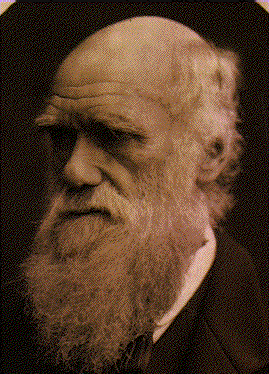
Charles Darwin

Charles Darwin, the author of The Origin of Species (1859, 1872), was born in 1809 and died in 1882. He is a fascinating character in our intellectual history. There are numerous biographies written about him. Darwin wrote copious quantities of notes, letters, and personal journal entries, which means that there is also a lot of material with which historians and biographers can work. I will share some of my gleanings to supplement the material in your book, A Student's Introduction to Charles Darwin, which is a better place to start.
Youth:
Darwin's father was a well-respected doctor from a wealthy family in England and his mother was a member of the Wedgewood family. Both families were well-to-do and high-society in class-stratified England. Charles Darwin himself was reputed not to have been a particularly diligent student. His father wished for him to become a doctor, but Charles didn't have the stomach for surgery. (Before anesthesia and modern hygiene, surgery was brutal.) So young Darwin studied for the ministry at Christ College in Cambridge, but he didn't really like that either.
Darwin did enjoy science and it was Natural Theology that most excited him in his religious studies. William Paley's Natural Theology was a very influential book in Darwin's studies. Paley argued that the natural world was so carefully and elegantly ordered that it implied the existence of a Creator God. So Charles Darwin seemed destined to be a minister in some parsonage, not a revolutionary thinker in science.
Voyage of the Beagle
Darwin's big break came in 1831 when he graduated from Cambridge and was offered a position on a sailing expedition aboard the HMS Beagle. The Beagle was off to undertake geographic explorations for Britain and the ship's captain needed a companion for dining and conversation (ship captains were not allowed to fraternize with the lower-class ship hands, so they often experienced mental instability due to long periods of social isolation.) Darwin was brought on board to be the ship's naturalist and geologist, though he had little formal training in these fields.
Well, a two-year sailing trip to South America turned into a five-year circumnavigation of the world and an adventure of a lifetime. Few of us today have such adventures. What must it have been like for the young Darwin to travel to parts of the Earth that were new and strange to the European world?
Darwin was a gifted observer and cataloguer of natural phenomena. Evidently, even by the end of his journey on the HMS Beagle upon his return to England in 1836, Darwin was already thinking secretly of some theory of evolution by descent from common origins.
Publishing the Theory of Natural Selection
So why did Darwin wait until 1859 to publish his theory, some twenty-three years after his grand expedition? Even then, he only came out with his views because another naturalist, Alfred Russell Wallace, was about to make the same claim.
We need to understand that Darwin is not the first to propose a theory of evolution. A French naturalist, Lamarck, had proposed a theory earlier in that century that had been widely discredited. Lamarckianism claimed that the phenotype affects the genotype. (Mind you, neither Lamarck nor Darwin knows what we now know about genetics.) Larmarck's theory translates into something like this: If you are a weight-lifter and build-up big muscles, then your children will tend to have big muscles too. Lamarck's ideas were widely debunked, especially in England.
So the problem that Darwin had to deal with was not evolution, but how evolution could work. The theory of Natural Selection was that answer.There were also powerful social and religious implications to Darwin's theory of which he was well aware and felt some turmoil about. Darwin confesses this in the Origin:
Nothing is easier than to admit in words the truth of the universal struggle for life, or more difficult -- at least I have found it so -- than constantly to bear this conclusion in mind. Yet unless it be thoroughly engrained in the mind, the whole economy of nature, with every fact on distribution, rarity, abundance, extinction, and variation, will be dimly seen or quite misunderstood. OK, people, why is it so difficult to admit the truth of Darwin's assertion about the universal struggle for life?
Family and Religion
Darwin, who traveled the world in his twenties, married a cousin and became a stay-at-home for the rest of his life. He had quite a few children, two of whom died of sickness. These deaths troubled Darwin a lot.While Darwin became something of an agnostic, his wife was very pious Christian. This dynamic also makes for exciting biography.
Finally, Darwin suffered from an unknown disease that he probably picked up during the voyage of the Beagle. He had recurring bouts of sickness and depression throughout his adult life, which limited his work and travel. He died at the age of 73 and was buried as something of a scientific hero.Truly his theory of natural selection revolutionized our view of ourselves and nature, but we'll save that discussion until later.
To view a more precise information on Charles Darwin click HERE.